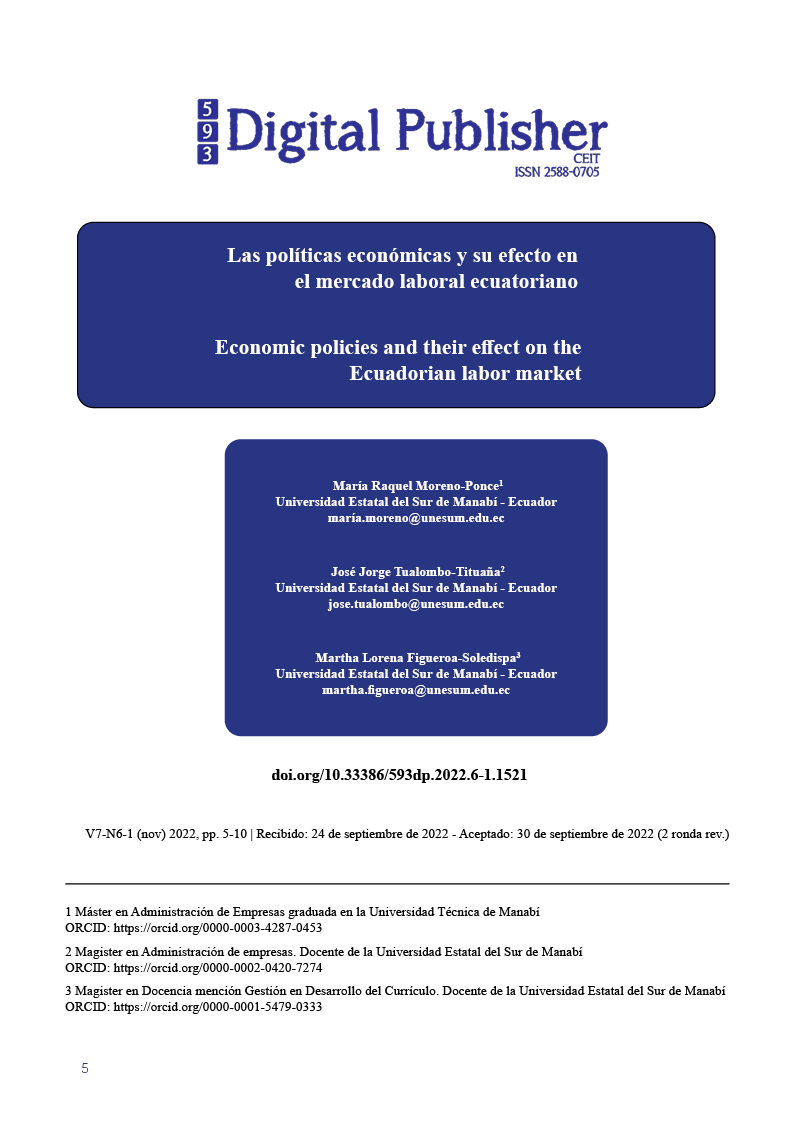Economic policies and their effect on the Ecuadorian labor market
Main Article Content
Abstract
This research study is developed with the objective of analyzing the main economic policies adopted by the State, and their effect on the Ecuadorian labor market. Therefore, a quantitative approach methodology is used, applying documentary and descriptive methods, for data collection the review of documents on economic policies issued in Ecuador in the last 15 years is used, with the use of the analytical level to interpret the results, among which it is highlighted that economic policies have been effective, these being a tool for labor production and large sources of employment that are evidenced in the increase in timely employment, and the decrease in underemployment and unemployment that can be seen in a regular constant between the years 2017-2019. The year 2020 has been a difficult year for the Ecuadorian economy, the spread of the covid-19 pandemic directly affected the effectiveness of economic policies, making it necessary to take social distancing measures and causing the closure of businesses that provided a source of employment for Ecuadorians. However, as of 2021, measures have been taken to promote a post-pandemic economic recovery, such as the humanitarian support law and the promotion of local credit, in order to boost the labor market and promote sustainable economic development. the Ecuadorians.
Downloads
Article Details

This work is licensed under a Creative Commons Attribution-NonCommercial-ShareAlike 4.0 International License.
1. Derechos de autor
Las obras que se publican en 593 Digital Publisher CEIT están sujetas a los siguientes términos:
1.1. 593 Digital Publisher CEIT, conserva los derechos patrimoniales (copyright) de las obras publicadas, favorece y permite la reutilización de las mismas bajo la licencia Licencia Creative Commons 4.0 de Reconocimiento-NoComercial-CompartirIgual 4.0, por lo cual se pueden copiar, usar, difundir, transmitir y exponer públicamente, siempre que:
1.1.a. Se cite la autoría y fuente original de su publicación (revista, editorial, URL).
1.1.b. No se usen para fines comerciales u onerosos.
1.1.c. Se mencione la existencia y especificaciones de esta licencia de uso.
References
Arévalo Luna, Guillermo Alexander. (2014). Ecuador: economía y política de la revolución ciudadana, evaluación preliminar. Apuntes del Cenes, 33(58), 109-134. http://www.scielo.org.co/scielo.php?script=sci_arttext&pid=S0120-30532014000200005&lng=en&tlng=es.
Baena, M. (2019). La importancia de las tics en la educación. Flup. https://www.flup.es/importancia-tics-educacion/
Cuadrado, J.R., Mancha, T., Villena, J.E., Casares, J., González, M., Marín, J.M. & Peinado, M.L. (2016). Política Económica: Elaboración, objetivos e instrumentos. Madrid: Mc Graw Hill. https://bit.ly/3RbdjLu
Hernández Sampieri, R., Fernández Collado, C., & Baptista Lucio, M. del P. (2014). Metodología de la Investigación. (Sexta edic). McGRAW-HILL / INTERAMERICANA EDITORES, S.A. DE C.V. https://www.uca.ac.cr/wp-content/uploads/2017/10/Investigacion.pdf
Illera Dulce, L. E., & Illera, J. C. (2015). Política empresarial: Línea de dirección y estratégias. Editorial CESA. https://bit.ly/3UG9AsC
INEC (2013). Reporte economía laboral. ENEMDU. Resumen ejecutivo. https://www.ecuadorencifras.gob.ec/camas/web-inec/EMPLEO/Informacion-2010-2011-2012-2013/2013/Septiembre2013/15anios/ReporteLaboralSep.pdf
INEC (2015). Desafíos para mejorar la medición del empleo. ENEMDU. https://www.cepal.org/sites/default/files/events/files/2015-10-tallereh-c-andres-alban.pdf
INEC (2020). Encuesta Nacional de Empleo, Desempleo y Subempleo (ENEMDU), anual 2020. Boletín Técnico N° 01-2020-ENEMDU. https://www.ecuadorencifras.gob.ec/documentos/web-inec/EMPLEO/2020/ENEMDU_telefonica/Boletin%20tecnico%20de%20empleo%20enemdu%20telefonica.pdf
INEC (2021). Encuesta Nacional de Empleo, Desempleo y Subempleo (ENEMDU), anual 2021. Boletín Técnico N° 05-2022-ENEMDU. https://www.ecuadorencifras.gob.ec/documentos/web-inec/EMPLEO/2021/Anual-2021/Bolet%C3%ADn%20t%C3%A9cnico%20anual%20enero-diciembre%202021.pdf
Macías Barrezueta, M. F., Maitta Rosado, I. S., Sánchez Rodríguez, A. D., & Cadena Macías, D. V. (2022). Principios fundamentales para la iniciación de la investigación científica. In La investigación con métodos cuantitativos. Casa Editora del Polo. https://www.casadelpo.com/_files/ugd/31263e_ea718b465c624a5a84cbb6e8715d6f94.pdf
Mazalema Macas, A. R., Saldarriaga Valarezo, A., & Moreno Sotomayor, G. R. (2022). Análisis de las políticas económicas del Ecuador y su incidencia en el crecimiento económico: Período 2007-2020. Dilemas Contemporáneos: Educación, Política y Valores, 3, 1–22. https://doi.org/10.46377/DILEMAS.V9I3.3233
Molero Oliva, L., Salcedo Muñoz, V., Campuzano Vásquez, J., & Bejarano Copo, H. (2019). Análisis econométrico del comportamiento del desempleo en el Ecuador (segundo trimestre 2007 a cuarto trimestre 2017). Tendencias, 20(2), 22-48. https://doi.org/10.22267/rtend.192002.119
Ramírez Prieto, A. E. (2018). Análisis de las principales políticas económicas implementadas en Ecuador: su incidencia en el crecimiento económico del país. [(Examen Complexivo). Universidad Técnica de Machala, Machala, Ecuador]. http://repositorio.utmachala.edu.ec/handle/48000/11962
Raza Carrillo, D. (2019). Política económica en Ecuador y su capacidad de impacto en el desarrollo: Entrevista a Carlos de la Torre. Estudios De La Gestión: Revista Internacional De Administración, (4), 141–151. https://doi.org/10.32719/25506641.2018.4.7
Rus Arias, E. (2021). Investigación descriptiva. Economipedia.Com. https://economipedia.com/definiciones/investigacion-descriptiva.html
Vacacela, J. (2021). Análisis de los segmentos del mercado laboral antes y durante la pandemia del Covid-19 en la ciudad de Guayaquil período 2018- 2021. [Universidad Católica de Santiago de Guayaquil. Ecuador]. http://201.159.223.180/bitstream/3317/17330/1/T-UCSG-PRE-ECO-CECO-338.pdf




